Risk Tipping Points – Where Hope Lies
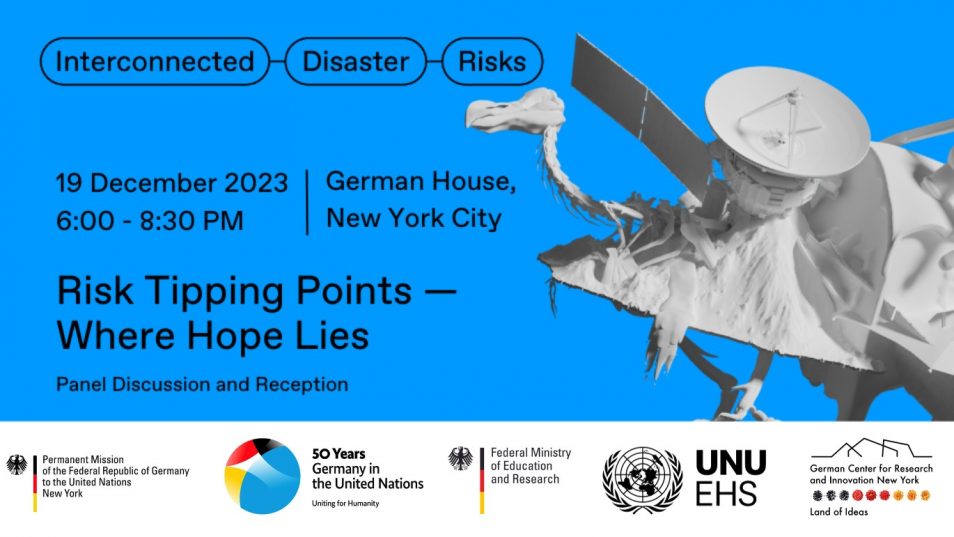 © UNU EHS
© UNU EHS
Join us to discuss ways to craft hope in times of crisis through education, research and science communication. The panel discussion was followed by a reception at the German House.
To the event photo gallery on smugmug.com.
We live in an interconnected world. As we become increasingly connected across the planet, so do the risks we share. The manifestation of those risks are disasters, vanishing biodiversity, pollution, and increasing inequalities across the globe. While the news is full of past disasters and stories of human suffering, hidden tipping points are looming that will change the fabric of risk and lead to more disasters and a multitude of lost opportunities.
In a time of global climate and biodiversity crises, UNU-EHS/UNU-VIE’s flagship report, Interconnected Disaster Risks 2023, looks at the shared causes and impacts of future risk tipping points and provides solution packages to not only steer us away from those tipping points, but to turn the trajectory towards hope and resilience.
Prof. Dr.-Ing. René Haak, representing the German Federal Ministry of Education and Research (BMBF), the donor ministry of UNU-EHS/UNU-VIE and funder of the “Interconnected Disaster Risks” report, Prof. Dr. Zita Sebesvari, lead author of the report at UNU-EHS, and Melissa Fleming, the UN Under-Secretary-General for Global Communications, discussed among themselves and with a wider audience ways to craft hope in times of crisis through education, research and science communication.
This event was a double celebration: 20 years of UNU-EHS, and 50 years of Germany’s commitment to the United Nations as one of its Member States.
Interconnected Disaster Risks 2023 - Risk Tipping Points
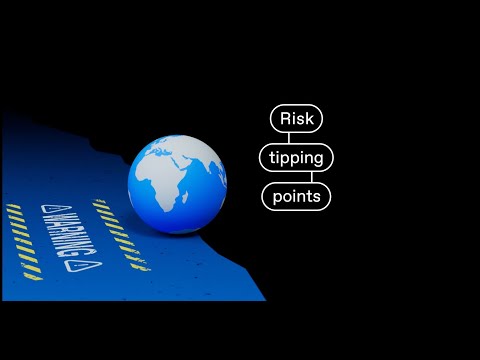
To play the video, click the thumbnail. Once activated data will be transmitted to the respective provider. Watch on YouTube
Event Information
December 19, 2023, 6:00 PM to 8:30 PM
German House, New York City
Organizer(s): United Nations University (UNU), German Federal Ministry of Education and Research, Permanent Mission of Germany to the United Nations, DWIH New York
Program
6:00 – Welcome Remarks by
- Ambassador Thomas Zahneisen, Deputy Permanent Representative, Permanent Mission of the Federal Republic of Germany to the United Nations
Thomas Zahneisen was represented by Ernst Roeder-Messell. - Prof. Dr. Shen Xiaomeng, Vice-Rector in Europe of the United Nations University (UNU) / Director of the UNU Institute for Environment and Human Security (UNU-EHS)
- Benedikt Brisch, Director of the German Center for Research and Innovation New York (DWIH)
6:15 – Presentation of the Interconnected Disaster Risks Report
- Prof. Dr. Zita Sebesvari, Deputy Director of UNU-EHS
6:45 – Panel Discussion
- Melissa Fleming, Under-Secretary-General for Global Communications
- Prof. Dr.-Ing. René Haak, Minister-Counselor and Head of Section Science and Technology, German Embassy Washington, D.C.
- Prof. Dr. Zita Sebesvari, Deputy Director of UNU-EHS
moderated by
- Prof. Dr. Shen Xiaomeng, Vice-Rector in Europe of the United Nations University (UNU)/Director of the UNU Institute for Environment and Human Security (UNU-EHS)
7:30 – Reception
Our Speakers

Prof. Dr. Shen Xiaomeng works as UNU Vice-Rector in Europe (UNU-ViE) and Director of the UNU Institute for Environment and Human Security (UNU-EHS). As the UNU Vice-Rector in Europe, Prof. Shen facilitates collaboration between UNU and stakeholders in and outside of the United Nations; contributes to high-level policy development with other United Nations entities and regional/national bodies; and guides UNU outreach efforts to Geneva-based UN entities, the European Commission, and European academic and research institutions. As the Director of UNU-EHS, Prof. Shen is the chief academic and administrative officer of the Institute and oversees its direction, organization and programmes. From 2011 onwards, Prof. Shen worked with the then International Bureau of the German Federal Ministry of Education and Research (Bundesministerium für Bildung und Forschung; BMBF) at the Project Management Agency of the German Aerospace Center (Deutsches Zentrum für Luft- und Raumfahrt-Projektträger; DLR-PT). Prof. Shen holds a BA degree from the Beijing Foreign Studies University, a MA degree from the University of Bonn and a PhD degree from the University of Bonn/UNU-EHS, with a focus on flood risk perception and communication in different cultural contexts.Prof. Dr. Shen Xiaomeng, UNU Vice-Rector in Europe (UNU-ViE) and Director of the UNU Institute for Environment and Human Security (UNU-EHS)
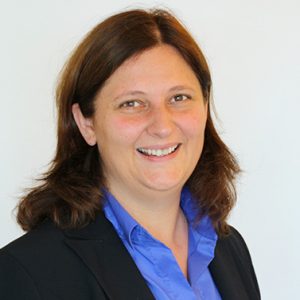
Prof. Dr. Zita Sebesvari is an internationally recognized expert in the fields of social-ecological risk assessments, ecosystem-based disaster risk reduction (Eco-DRR), and ecosystem-based adaptation (EbA), with a focus on low-lying coastal areas, such as river deltas. An ecologist by training, she holds a Ph.D. (Dr. rer. nat.) in Environmental Science from the Carl von Ossietzky University in Oldenburg, Germany. She also holds a M.Sc. in History, and has a great interest in inter- and transdisciplinary research design and project implementation. Prof. Sebesvari is author or co-author of around 70 publications, and served as a Lead Author of the IPCC Special Report on Ocean and the Cryosphere in a Changing Climate (SROCCC, Chapter 4 and Summary for Policymakers; 2019). In her personal capacity, Dr. Sebesvari is member of the European Commission expert group Mission Board for Adaptation to Climate Change including Societal Transformation since September 2022. At UNU-EHS, she has held the position of Head of the Environmental Vulnerability and Ecosystem Services (EVES) Section from 2017 – 2022; prior to this, she worked as a Senior Scientist at UNU-EHS for several years.Prof. Dr. Zita Sebesvari, Deputy Director, UNU Institute for Environment and Human Security (UNU-EHS)
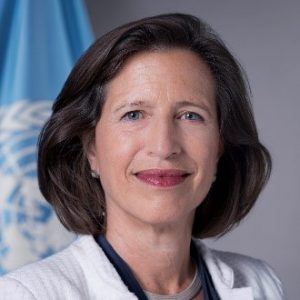
Melissa Fleming is Under-Secretary-General for Global Communications at the United Nations, having taken up her post in September 2019. Ms. Fleming leads the UN’s Department of Global Communications, which is responsible for informing global audiences about the state of the world and engaging them to build support for the Organization’s work and goals. In this role, Ms. Fleming oversees the UN’s strategic communications operations, including its multilingual news and digital media services, public outreach programmes, and global campaigns. Under her leadership, the UN Department of Global Communications engages in far-reaching efforts to address misinformation, disinformation, and hate speech. She is leading on the development of a Code of Conduct for Information Integrity on Digital Platforms. Previously, Ms. Fleming served 10 years at the UN Refugee Agency (UNHCR) as Head of Global Communications. Prior to that, she was the Spokesperson and Head of Media and Outreach at the International Atomic Energy Agency (IAEA). She also headed the Press and Public Information team at the Organization for Security and Co-operation in Europe (OSCE). Ms. Fleming is a TED speaker, the author of the book, A Hope More Powerful than the Sea, and the host of the award-winning UN podcast, Awake at Night. Ms. Fleming holds a Master of Science in Journalism from the College of Communication, Boston University and a Bachelor of Arts in German Studies from Oberlin College.Melissa Fleming, Under-Secretary-General for Global Communications, United Nations
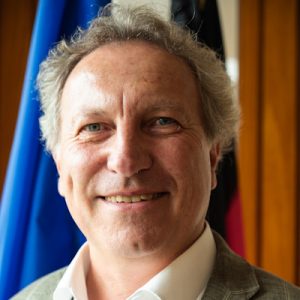
Prof. Dr.-Ing. René Haak joined the German Federal Ministry of Education and Research (BMBF) in 2005. He previously served as Head of the Division Global Change and Climate Research and Head of the Business and Economics Section and Deputy Director at the German Institute for Japanese Studies (DIJ, Tokyo), where he worked between 1999 and 2005. Between 2011 and 2014, Dr. Haak was the head of the science and technology section at the German Embassy in Beijing. He has given lectures at the Brandenburg University of Applied Sciences (Germany), European University Viadrina (Germany), Hosei University (Japan), Nishogagusha University Chiba (Japan), Tsinghua University (China), and the University of Hawaii at Manoa (USA). He has a Ph.D in engineering from Technische Universität Berlin (Germany).Prof. Dr.-Ing. René Haak, Minister-Counselor and Head of Section Science and Technology, German Embassy Washington, D.C.
